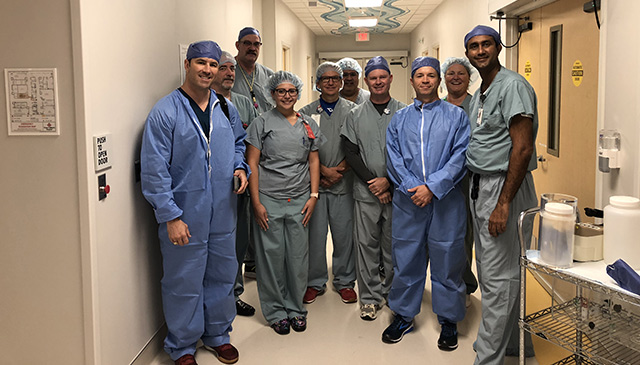Not too long ago a child with hepatocellular carcinoma – a rare liver cancer – would have few options for treatment and even fewer chances of long term survival.
In most cases, these tumors are discovered so late that surgery and transplant are not viable options to save a young child’s life. Families could hope for recovery, but the odds would not support their optimism.
The good news is that today is a new day.
A multidisciplinary team, led by Dr. Kamlesh Kukreja, expert in Interventional Radiology; is successfully performing the Trans-Arterial Radioembolization procedure – called TARE – on children who have this rare disease.
“There are only three hospitals in the country performing TARE and we are one of them,” Kukreja said. “We are the only one in the state of Texas.”
He added that TARE has the potential to regress tumors and help patients live with their own liver or keep the tumor in control until a liver transplant is available. An additional advantage is that TARE is an outpatient procedure, which allows the child to recover at home.
How it all works
TARE is administered in two steps. Step one involves identifying the angiographic anatomy of the tumor mapping the vascular supply of the cancer to assess how much radiation it can handle, while still keeping the patient safe.
“Two to four weeks after this mapping, the patient returns for the radioactive chemical agent – called Yttrium-90 (Y90) – to be administered directly to the artery supplying the tumor,” Kukreja said. “This administration is targeted and direct, which allows for higher doses of radiation to be administered with minimal side effects; unlike systemic chemotherapy, which has been found to not work well in these cases.”
Record of Success
Kukreja has successfully performed TARE on two patients to date with one patient showing a clear regression in the growth of the tumor allowing complete surgical resection.
Although Texas Children’s is one of the pioneers of TARE in pediatrics, it’s important to note that TARE is a frontline therapy at adult hospitals for patients with the most common type of liver cancer. Accumulating evidence from studies with adult liver cancer suggests that TARE is a promising strategy which may benefit children as well.
The people that make It possible
“We are very proud of what we have been able to accomplish so far and the way we have raised the standard of care for our patient families,” Dr. Kukreja added. “We are also proud that a multidisciplinary team has made this possible.”
The decision to use this approach is first made by a multidisciplinary team involving:
Dr. Prakash Masand, Radiology
Dr. Andras Heczey, Oncology
Dr. Sanjeev Vasudevan, Pediatric Surgery
Dr. John Goss, Transplant surgery
The hands-on clinical teams at Texas Children’s include interventional radiology, nuclear medicine, radiation safety, anesthesia and Dr. Armeen Mahvash, associate professor at M. D. Anderson Cancer Center.
To Learn More
If you know a patient who could benefit from this treatment, please reach out to the department of Interventional Radiology at 832-824-5565 or liver tumor team at https://www.texaschildrens.org/departments/liver-tumor-program. Dr. Kukreja can be reached at kukukrej@texaschildrens.org/kukreja@bcm.edu.


